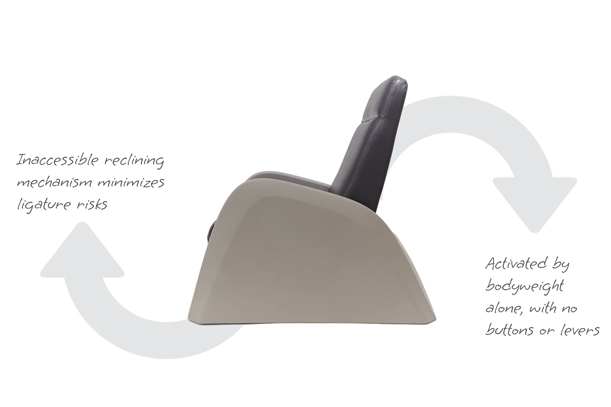Patients living with mental health disorders also experience higher frequencies of physical illnesses including cardiovascular¹, respiratory² and metabolic³ disorders.
These comorbidities can result in patients with complex mobility needs who can benefit from the restful and repositionable nature of a reclining chair.
There are also situations, for example during crisis stabilization, during which short periods of rest and sleep may be required until an assessment has been made.
Many reclining chairs can present safety risks in mental health environments, either due to their controls (handles, buttons and electric handsets) or their reclining mechanisms, which may be tampered with or used as a ligature point.
The Levo reduced ligature reclining chair has been designed to minimize these risks. Activated by body weight alone, there are no external controls, and the reclining mechanism has been made inaccessible to minimize ligature risks.

Levo’s modular construction allows staff to separate the seat from the base to enable thorough cleaning and safer inspection practices. The modular design also means sections can be repaired individually, extending the life of the furniture and minimizing waste.
Click to explore Levo reduced-ligature recliner.
Download the brochure here.
1. Nielsen RE, Banner J, Jensen SE. Cardiovascular disease in patients with severe mental illness. Nat Rev Cardiol. 2021;18(2):136–145
2. Brown S, Kim M, Mitchell C, Inskip H: Twenty-five year mortality of a community cohort with schizophrenia. Br J Psychiatry 2010;196:116-121
3. Wysokinski A, Strzelecki D, Kloszewska I. Levels of triglycerides, cholesterol, LDL, HDL and glucose in patients with schizophrenia, unipolar depression and bipolar disorder. Diabetes Metab Syndr. 2015;9:168–176
